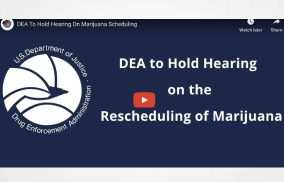This is the official line..
Cannabis Rescheduling Hearings Start Today |
5 Key Insights for CoverageWashington, D.C.—Formal hearings regarding the Department of Justice’s (DOJ) notice of proposed rulemaking (NPRM) to move cannabis to Schedule III begin today at 9:30 a.m. ET. The hearing will be live-streamed at www.DEA.gov/live. “Patients have been waiting for a cannabis rescheduling hearing for decades. It is our hope that today’s proceedings will ensure patients have a strong voice,” said Steph Sherer, Founder and President of Americans for Safe Access. Preliminary rulings on the standing of participants were based on the presumption that the DEA would defend the recommendation of Schedule III. In light of the DEA’s Prehearing Statement, many hope that Chief Administrative Law Judge Mulrooney will revisit the participants’ standing. Americans for Safe Access (ASA) has been advocating for the reclassification of cannabis for over 22 years. Their efforts include filing a rescheduling petition with a coalition of patients in 2003, suing the DEA to prompt a decision on a rescheduling petition (ASA vs. DEA), participating in successful initiatives to reschedule cannabis in international drug treaties through the United Nations, and recently advising the FDA in the current rescheduling effort. ASA is available to answer questions about the hearings and can provide access to a network of patients, medical professionals, regulatory experts, and other cannabis stakeholders for interviews. 5 Key Insights for Reporters Covering These Hearings: Insight # 1- Cannabis as a Schedule III SubstanceRescheduling is a start, but it’s just another layer of red tape without federal reform. Rescheduling cannabis has sparked headlines and hope, but this move won’t deliver the transformation patients need. Rescheduling to Schedule III (or II) might unlock research and reduce stigma, but it won’t make cannabis more accessible, affordable, or integrated into healthcare. Federal law will still treat medical cannabis businesses as traffickers, and patients will remain caught in a patchwork of state programs. Without Congressional action, rescheduling could become another false promise, delaying the real reforms needed to make cannabis a mainstream medicine. Continue reading… Insight # 2- Judge Granted Standing Based on DEA Embracing Schedule III, Prehearing Statements Upends this NotionOn November 11, 2024, Judge Mulrooney issued the “Order Regarding Standing, Scope, And Prehearing Procedures On Standing” (ORS), informing the Designated Parties (DP) of his process for determining standing, identifying which DP had been granted standing, and providing instructions for the Preliminary Hearing Statements (PHS) due on November 26, 2024. In the order, he explained: “[t]he phrase ‘person adversely affected or aggrieved’ is a term of art used in many statutes to designate those who have standing to challenge or appeal an agency decision, within the agency or before the courts.” (ORS pg 5) and made references to the role of the “the Government,” Drug Enforcement Administration (DEA), in the proceeding as defending the Notice of Proposed Rulemaking (NPRM) to transfer marijuana from Schedule I to Schedule III. Continue reading… Insight # 3- Significant Developments Have Happened Since the Last Cannabis Rescheduling PetitionWhile rescheduling cannabis to Schedule III may seem like a significant deviation from the recommendations provided by the Department of Health and Human Services (HHS) in their 2015 “Basis for the Recommendation for Maintaining Marijuana in Schedule I of the Controlled Substances Act,” which led to the Drug Enforcement Administration’s (DEA) 2016 “Denial of Petition to Initiate Proceedings to Reschedule Marijuana,“ it’s essential to recognize the substantial changes that have occurred since then. Continue reading… Insight # 4- Addressing the Use v Abuse ParadoxA new approach to determining cannabis’ ‘actual or relative potential for abuse” is needed that includes a definition for cannabis consumption that separates those who are choosing to use cannabis to enhance their life similarly to how alcohol is viewed and the 6 million+ Americans who are successfully using medical cannabis, from those that may demonstrate issues defined under the controversial Cannabis Abuse Disorder. Continue reading… Insight # 5- HHS Unlikely to Appear at Hearing, Despite DEA’s Challenging Findings & Threat of SubpoenaGiven the legal framework and historical context, it appears unlikely that the DEA will succeed in compelling HHS or FDA officials to testify in the rescheduling hearings. The Controlled Substances Act and relevant case law suggest that while the DEA is not strictly bound by HHS’s recommendations on whether a drug has a “currently accepted medical use,” it must give significant deference to HHS’s scientific and medical findings throughout the rulemaking process. Continue reading… Background on Hearing:In response to President Biden’s October 6, 2022, request of Health and Human Services (HHS) and the DOJ to revisit the scheduling of cannabis under the Controlled Substance Act (CSA), on May 21, 2024, the DOJ issued a notice of proposed rulemaking (NPRM) to transfer marijuana from Schedule I to Schedule III: Schedules of Controlled Substances: Rescheduling of Marijuana, 89 Fed. Reg. 44597, 44597 (2024). On August 29, 2024, the Drug Enforcement Administration (DEA) Administrator Anne Milgram issued a notice (General Notice of Hearing or GNoH) per 21 U.S.C. § 811(a), which specifies a non-legislative transfer of controlled substances can only happen “after opportunity for a hearing pursuant to the rulemaking procedures,” that the DEA would hold in-person hearing proceedings beginning December 2, 2024. Schedules of Controlled Substances: Rescheduling of Marijuana, 89 Fed. Reg. 70148, 70148-49 (2024). DEA Administrator Milgram assigned Chief Administrative Law Judge John J. Mulrooney, II, to oversee the proceedings. The hearing will include representatives from the DEA assumed to defend the position of the NPRM (the Schedule III status) and 19 of the 25 “Designated Participants (DP)” that Administrator Milgram chose among an unknown number of individuals and organizations that requested to participate. Twelve of which Judge Mulrooney has granted standing status. In his October 31, 2024, Preliminary Order (PO), Judge Mulrooney ordered all the participants to appear on December 2, 2024 but also said the witnesses would not testify at this hearing. In his November 11, 2024, “Order Regarding Standing, Scope, and Prehearing Procedures on Standing” (ORS), Judge Mulrooney described the procedure in more detail: “The Government, as the burdened party, will present its evidence first. Those DPs who support the NPRM (Pro-Rescheduling DPs) will present evidence following the conclusion of the Government’s case. The DPs who oppose the NPRM (Anti-Rescheduling DPs) will present evidence following the conclusion of the Pro-Rescheduling DPs’ presentations. All DPs (Pro and Anti) will be limited to a single witness each, with direct examination limited to no more than approximately ninety (90) minutes (excluding cross-examination). Anti-Rescheduling DPs may cross-examine all Government witnesses and all Pro-Rescheduling witnesses. Witnesses presented by the Anti-Rescheduling DPs may be cross-examined by the Government and Pro-Rescheduling DPs. In all cases, cross-examination will be limited to approximately twenty (20) minutes per witness for each authorized cross-examiner. Within the further discretion of the tribunal, presentations may be grouped (or even consolidated) by the tribunal in accordance with commonly expressed viewpoints as set forth in the Parties’ respective POR”s.-pg 43 ASA will be providing regular updates and analysis on these proceedings: to receive updates, sign up today. #### Additional Resources: History of Cannabis Scheduling Unpacking Department of Justice’s Notice of Proposed Rulemaking |


















